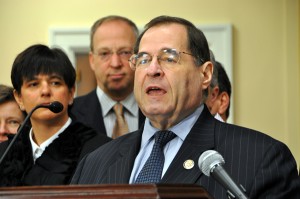National
DOMA repeal bills introduced in House, Senate
Respect for Marriage Act introduced for first time ever in Senate

House and Senate lawmakers on Wednesday pledged to lift the Defense of Marriage Act from the books upon the introduction of legislation that would repeal the anti-gay law that bars federal recognition of same-sex marriage.
In the House, Rep. Jerrold Nadler (D-N.Y.) introduced the legislation, known as the Respect for Marriage Act, along with 108 co-sponsors. Among the supporters are the four openly gay members of Congress: Reps. Barney Frank (D-Mass.), Tammy Baldwin (D-Wisc.), Jared Polis (D-Colo.) and David Cicilline (D-R.I.).
On the same day, Sen. Dianne Feinstein (D-Calif.), among the 14 senators who voted against DOMA in 1996, introduced companion legislation in the Senate. Among the 18 co-sponsors of the Senate bill are Patrick Leahy (D-Vt.), Kirsten Gillibrand (D-N.Y.), Chris Coons (D-Del.) and Richard Blumenthal (D-Conn.).
Feinstein’s introduction of the bill in the Senate marks the first time that DOMA repeal legislation has been put forward in the upper chamber of Congress since the law’s passage 15 years ago.
At a news conference on Wednesday, Nadler denounced DOMA for treating married same-sex couples as “complete strangers” under federal law.
“This defies common sense and harms thousands of married couples who are denied federal responsibilities and rights, including access to programs like Social Security, that other couples can count on when getting married,” Nadler said.
Baldwin said those who have been fighting DOMA since it became law have always known fairness and justice were on their side.
“Repealing DOMA is important symbolically and substantively,” Baldwin said. “Now that we have repealed ‘Don’t Ask, Don’t Tell,’ the Defense of Marriage Act remains the only example of overt discrimination against gays and lesbians written into our federal statutes.”
In a separate conference later in the day, Feinstein noted that DOMA bars married same-sex couples from obtaining access to government programs that straight couples enjoy for economic stability.
“Right now, because of DOMA, these couples cannot take advantage of federal protections available to every other married couple in this country,” she said.
Gillibrand said the fight to repeal DOMA is about fairness and called the ability to get married and start a family “a basic human right.”
“Every loving couple in America deserves this right, and no politician should stand in their way,” Gillibrand said. “Marriage is the foundation for strong families; it gives couples the base they need to build a long-lasting life together, start a family, raise children and put their children on the successful path for their future.”
Gillibrand commended states throughout the country for legalizing same-sex marriage and added she “looks forward to the day … when marriage equality is the law of the land from coast to coast.”
Passed by Congress in 1996, DOMA was signed into law by President Clinton. Both Clinton and the bill’s sponsor at the time, former Republican Congressman Bob Barr, have come out for repeal of the legislation.
DOMA has two components: one that prohibits the federal government from recognizing same-sex marriage and another that allows states not to recognize such marriages performed in other jurisdictions.
As a result of the component of DOMA known as Section 3, married same-sex couples cannot participate in federal programs. For instance, they can’t file joint federal income faxes, receive spousal benefits under Social Security or obtain exemptions of the estate tax law upon the death of one of the spouses.
At the House news conference, Evan Wolfson, executive director of Freedom to Marry, said repeal of DOMA is important because “we do not have second-class citizens, and we should not have second-class marriages.”
“To be excluded from marriage … is personal and a real hardship,” Wolfson said. “It is an indignity and it is manifest injustice when it is discrimination practiced by the government.”
In addition to repealing DOMA, the Respect for Marriage Act contains a “certainty provision” that would allow same-sex couples married in one juridiction to continue to receive the federal benefits of marriage even if they move to a state that doesn’t recognize same-sex marriage.
But the proposed legislation wouldn’t cover all relationship recognition that same-sex couples can access throughout the United States. Gay couples in civil unions or domestic partnerships aren’t covered under the legislation.
Married same-sex couples that claim they’ve experienced hardship under DOMA were present at the news conferences to advocate for the law’s repeal.
Pali Cooper, a chiropractor from Corte Madera, Calif., who married her spouse, Jeanne Rizzo, executive director of the Breast Cancer Fund, in 2008 when same-sex marriage was legal in California, said DOMA prevented her and her spouse from receiving full rights under the law.
“We’re married in California, but we’re single with the government, and it’s confusing, cumbersome and it’s simply unnecessary,” Cooper said.
Rizzo recalled that when returning from a trip abroad, U.S. Customs forced she and her spouse to re-enter into the United States in separate waiting lines because they weren’t legally married in the eyes of the federal government.
“Right at that moment, it really, really hit me — the difference between, ‘Yes, we were all celebrating being married in California,’ but in the eyes of our government, we were not,'” Rizzo said.
Several lawsuits seeking to overturn the part of DOMA prohibiting federal recognition of same-sex couples are making their way through the courts. Last month, President Obama declared the law unconstitutional and said he would no longer defend the statute against litigation in court, although House Speaker John Boehner has directed counsel to defend the law.
Nadler said opponents of the law shouldn’t wait for the lawsuits to end before moving ahead legislatively.
“Rather than delegating the issue to the court, Congress should repeal DOMA now and bring an end to the harm it causes gay and lesbian families each and every day,” Nadler said.
The House version of the DOMA repeal legislation has new co-sponsors that weren’t seen in the 111th Congress when the bill was first introduced in that chamber, including Frank, House Minority Leader Nancy Pelosi (D-Calif.) and House Minority Whip Steny Hoyer (D-Md.).
In the previous Congress, Frank said he wasn’t a co-sponsor of the legislation because he thought the certainty provision of the bill would cause political problems. Frank said he changed his mind because of the importance of educating House members.
“It just seemed to me that that was the more important message to get across at this point,” Frank said. “I’m less worried about the distraction on the question of the recognition by one state violating another state’s right.”
Drew Hammill, a Pelosi spokesperson, explained that Pelosi rarely co-sponsored any legislation during the time when Democrats held a majority in the chamber.
“She sponsored bills very rarely as speaker, and she has fought against discrimination her entire congressional career, regardless of what bills she has sponsored as speaker or leader,” Hammill said.
Despite the new support for the legislation in Congress, passage of DOMA repeal legislation remains an uphill battle to say the least — especially with a Republican majority in the House. A spokesperson for Boehner declined to comment on the Respect for Marriage Act.
Nadler said the Republican-controlled House Judiciary Committee is “uncommitted at this point” on whether to take up the Respect for Marriage Act.
“We’re going to ask for that,” Nadler added. “The fact that 108 people put their names on the bill initially before it’s introduced shows a considerable amount of support for it, obviously.”
In the Democratic-controlled Senate, passage would be difficult even if all 53 Democrats in the chamber voted to approve the repeal legislation. A spokesperson for Senate Majority Leader Harry Reid (D-Nev.) didn’t respond on short notice to the Washington Blade’s request to comment on the bill.
A Senate Democratic aide, who spoke on condition of anonymity, said leadership from the Obama administration and education of members of Congress has to happen before DOMA repeal moves forward.
“What is on everyone’s radar is budget: Budget 1, Budget 2, Budget 3,” the aide said. “That’s what everyone is thinking about right now in the Senate. The problem is you’re going to have to get 60 votes in the Senate for this thing, and that’s a high hurdle, especially with 53 Democrats.”
Shin Inouye, a White House spokesperson, said the president is committed to DOMA repeal and will work with Congress to move ahead on the issue.
“The president has long said that DOMA is discriminatory and should be repealed by Congress,” Inouye said. “We welcome the introduction of bills that would legislatively repeal DOMA, and look forward to working with lawmakers to achieve that goal.”
Even if proponents of DOMA repeal don’t pass the legislation in this Congress, Feinstein said the bill’s supporters will continue working for the bill in the years ahead.
“It’s a long road; we have undertaken to go on that road and make those changes,” Feinstein said. “As has been said, whether it takes one year, or two years, or three years, or four years, we are committed to it.”
Feinstein said she thinks the legislation could pass out of the Senate Judiciary Committee after the panel holds hearings on the issue, although she said she doesn’t have a timeline for when she thinks the legislation would progress in the Senate.
“I tend to think we’ll be successful at that stage and then will come the time for floor consideration,” Feinstein said. “When the hearings are held, nobody can say we pushed anything through, but everybody has the chance to express themselves.”
One major obstacle for passing the legislation is lack of Republican co-sponsors on either the House or the Senate bill.
In the House. Nadler said he’s hoping Republican co-sponsors will sign on to the bill, noting that members of the GOP, such as former Vice President Dick Cheney and gay former Republican National Committee chair Ken Mehlman have endorsed same-sex marriage.
“The political factors that made for less Republican support are going down,” Nadler said. “I’m confident we will have Republican support over time, and the sooner the better obviously.”
Even though the Senate is under Democratic control, Republican support would be needed to reach the 60-vote threshold to pass the legislation out of the chamber.
Feinstein expressed confidence that Republican support will grow for the Senate version of the bill.
“I think as the community gets to talk with Republicans, and people from Republican areas talk with Republicans, there is growing … support,” Feinstein said.
Christian Berle, deputy executive director of the Log Cabin Republicans, said his organization will work to obtain more Republican support for the Respect for Marriage Act.
“We are confident that there will be a Republican on the House bill, and potentially the Senate bill, and we will be one step closer to ending this failed policy,” Berle said. “We look forward to help building a broad, bipartisan majority that will get repeal of DOMA to the president’s desk, and get the federal government out of the marriage business.”
State Department
HIV/AIDS activists protest at State Department, demand full PEPFAR funding restoration
Black coffins placed in front of Harry S. Truman Building

Dozens of HIV/AIDS activists on Thursday gathered in front of the State Department and demanded the Trump-Vance administration fully restore President’s Emergency Plan for AIDS Relief funding.
Housing Works CEO Charles King, Health GAP Executive Director Asia Russell, Human Rights Campaign Senior Public Policy Advocate Matthew Rose, and others placed 206 black Styrofoam coffins in front of the State Department before the protest began.
King said more than an estimated 100,000 people with HIV/AIDS will die this year if PEPFAR funding is not fully restored.
“If we continue to not provide the PEPFAR funding to people living in low-income countries who are living with HIV or at risk, we are going to see millions and millions of deaths as well as millions of new infections,” added King.
Then-President George W. Bush in 2003 signed legislation that created PEPFAR.
The Trump-Vance administration in January froze nearly all U.S. foreign aid spending for at least 90 days. Secretary of State Marco Rubio later issued a waiver that allows the President’s Emergency Plan for AIDS relief and other “life-saving humanitarian assistance” programs to continue to operate during the freeze.
The Washington Blade has previously reported PEPFAR-funded programs in Kenya and other African countries have been forced to suspend services and even shut down because of a lack of U.S. funding. Two South African organizations — OUT LGBT Well-being and Access Chapter 2 — that received PEPFAR funding through the U.S. Agency for International Development and the Centers for Disease Control and Prevention in recent weeks closed down HIV-prevention programs and other services to men who have sex with men.
Rubio last month said 83 percent of USAID contracts have been cancelled. He noted the State Department will administer those that remain in place “more effectively.”
“PEPFAR represents the best of us, the dignity of our country, of our people, of our shared humanity,” said Rose.
Russell described Rubio as “ignorant and incompetent” and said “he should be fired.”
“What secretary of state in 90 days could dismantle what the brilliance of AIDS activism created side-by-side with George W. Bush? What kind of fool could do that? I’ll tell you who, the boss who sits in the Harry S. Truman Building, Marco Rubio,” said Russell.

U.S. Military/Pentagon
Pentagon urged to reverse Naval Academy book ban
Hundreds of titles discussing race, gender, and sexuality pulled from library shelves

Lambda Legal and the Legal Defense Fund issued a letter on Tuesday urging U.S. Defense Secretary Pete Hegseth to reverse course on a policy that led to the removal of 381 books from the Nimitz Library of the U.S. Naval Academy in Annapolis, Md.
Pursuant to President Donald Trump’s executive order 14190, “Ending Radical Indoctrination in K-12 Schooling,” the institution screened 900 titles to identify works promoting “diversity, equity, and inclusion,” removing those that concerned or touched upon “topics pertaining to the experiences of people of color, especially Black people, and/or LGBTQ people,” according to a press release from the civil rights organizations.
These included “I Know Why the Caged Bird Sings” by Maya Angelou, “Stone Fruit” by Lee Lai, “The Hate U Give” by Angie Thomas, “Lies My Teacher Told Me: Everything Your American History Textbook Got Wrong” by James W. Loewen, “Gender Queer: A Memoir” by Maia Kobabe, and “Democracy in Black: How Race Still Enslaves the American Soul” by Eddie S. Glaude, Jr.
The groups further noted that “the collection retained other books with messages and themes that privilege certain races and religions over others, including ‘The Clansman: A Historical Romance of the Ku Klux Klan’ by Thomas Dixon, Jr., ‘Mein Kampf’ by Adolf Hitler, and ‘Heart of Darkness’ by Joseph Conrad.
In their letter, Lambda Legal and LDF argued the books must be returned to circulation to preserve the “constitutional rights” of cadets at the institution, warning of the “danger” that comes with “censoring materials based on viewpoints disfavored by the current administration.”
“Such censorship is especially dangerous in an educational setting, where critical inquiry, intellectual diversity, and exposure to a wide array of perspectives are necessary to educate future citizen-leaders,” Lambda Legal Chief Legal Officer Jennifer C. Pizer and LDF Director of Strategic Initiatives Jin Hee Lee said in the press release.
Federal Government
White House sues Maine for refusing to comply with trans athlete ban
Lawsuit follows months-long conflict over school sports in state

The Justice Department is suing the state of Maine for refusing to comply with President Donald Trump’s executive order banning transgender athletes from participating in school sports, U.S. Attorney General Pam Bondi announced on Wednesday.
DOJ’s lawsuit accuses the state of violating Title IX rules barring sex discrimination, arguing that girls and women are disadvantaged in sports and deprived of opportunities like scholarships when they must compete against natal males, an interpretation of the statute that reverses course from how the law was enforced under the Biden-Harris administration.
“We tried to get Maine to comply” before filing the complaint, Bondi said during a news conference. She added the department is asking the court to “have the titles return to the young women who rightfully won these sports” and may also retroactively pull federal funding to the state for refusing to comply with the ban in the past.
Earlier this year, the attorney general sent letters to Maine, California, and Minnesota warning the blue states that the department “does not tolerate state officials who ignore federal law.”
According to the Maine Principals’ Association, only two trans high school-aged girls are competing statewide this year. Conclusions from research on the athletic performance of trans athletes vis-a-vis their cisgender counterparts have been mixed.
Trump critics and LGBTQ advocates maintain that efforts to enforce the ban can facilitate invasive gender policing to settle questions about an individual athlete’s birth sex, which puts all girls and women at risk. Others believe determinations about eligibility should be made not by the federal government but by school districts, states, and athletics associations.
Bondi’s announcement marked the latest escalation of a months-long feud between Trump and Maine, which began in February when the state’s Democratic governor, Janet Mills, declined to say she would enforce the ban.
Also on Wednesday, U.S. Education Secretary Linda McMahon said the findings from her department’s Title IX investigation into Maine schools — which, likewise, concerned their inclusion of trans student-athletes in competitive sports — was referred to DOJ.
Earlier this month, the Justice Department pulled $1.5 million in grants for Maine’s Department of Corrections because a trans woman was placed in a women’s correctional facility in violation of a different anti-trans executive order, while the U.S. Department of Agriculture paused the disbursement of funds supporting education programs in the state over its failure to comply with Title IX rules.
A federal court last week ordered USDA to unfreeze the money in a ruling that prohibits the agency from “terminating, freezing, or otherwise interfering with the state’s access to federal funds based on alleged Title IX violations without following the process required by federal statute.”
-

 District of Columbia4 days ago
District of Columbia4 days agoFinal push to raise funds, fill D.C. hotels as WorldPride nears
-

 District of Columbia4 days ago
District of Columbia4 days agoReenactment of 1965 gay rights protest at White House set for April 17
-

 El Salvador2 days ago
El Salvador2 days agoGay Venezuelan makeup artist remains in El Salvador mega prison
-

 Maryland4 days ago
Maryland4 days agoFreeState Justice: Transgender activist ‘hijacked’ Moore’s Transgender Day of Visibility event












